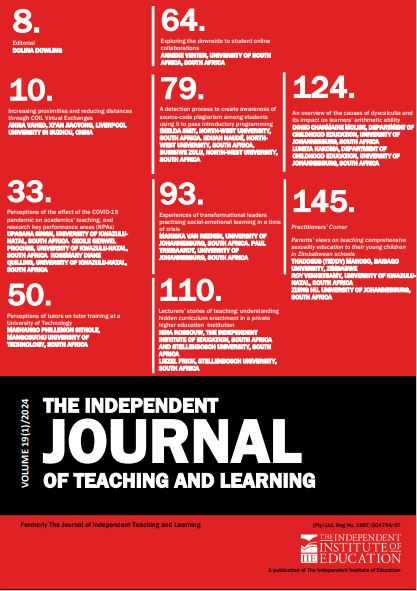A detection process to create awareness of source-code plagiarism among students using it to pass introductory programming
DOI:
https://doi.org/10.17159/ijtl.v19i1.18854Keywords:
introductory programming, source-code plagiarism, source-code plagiarism detection tool, source-code plagiarism awareness, source-code plagiarism categoriesAbstract
The COVID-19 pandemic restrained the academic environment and changed the rules of the educational game; contact classes were restricted, and online assessments had to be introduced. This situation opened an opportunity for some students to use source-code plagiarism to pass coding assessments in the Introduction to Programming subject module. The focus of this paper is on making sense of this environment to establish a process to ensure that students obtain the skills they need to build on in subsequent modules. This is necessary to reach the outcomes of a computing course. Four aspects were used in establishing this source-code plagiarism awareness process in focusing on one class of students. Qualitative data were gathered by firstly requesting the class to supply feedback on their understanding of source-code plagiarism, and secondly inviting students identified as guilty of Python source-code plagiarism to start a conversation with the lecturer, which was triangulated with quantitative data regarding the success of the latter group in terms of their pass rate. Although the Measure of Software Similarity tool was instrumental in establishing a source-code plagiarism detection process, it is cumbersome and time consuming. Hence fourthly, it was compared to other available tools to determine their suitability in comparison. A refined source-code plagiarism awareness process is the resultant finding of this paper.
References
Bhosale, U. (2022). Best Plagiarism Checker Tool for Researchers- Top 4 to Choose From! Retrieved 2 February 2024 from https://www.enago.com/academy/best-plagiarism-checker-tool-for-researchers/
Cheers, H., Lin, Y., & Smith, S. P. (2021). Academic Source-code Plagiarism Detection by Measuring Program Behavioural Similarity. School of Electrical Engineering & Computing, 1-18.
Codequiry. (2021). The effectiveness of Codequiry's code plagiarism checking tool. Retrieved 2 February 2024 from https://codequiry.com/code-plagiarism-checker
CopyLeaks. (2021). Origin of CopyLeaks. Retrieved 2 February 2024 from https://copyleaks.com/about-copyleaks
Cosma, G. & Joy, M. (2008). Towards a definition of source-code plagiarism. IEEE Transactions on Education, 51(2), 195-200.
Erkaya, O. R. (2009). Plagiarism by Turkish students: Causes and solutions. Asian EFL journal, 11(2), 86-103.
Erlingsson, C. & Brysiewicz, P. (2017). A hands-on guide to doing content analysis. African journal of emergency medicine, 7(3), 93-99.
Gomes, A. & Mendes, A. J. (2007). Learning to program - difficulties and solutions. International Conference on Engineering Education – ICEE, 7, 1-5.
Hage, J., Rademaker, P., & Vugt, N. (2010). A comparison of plagiarism detection tools. Department of Information and Computing Sciences, Utrecht University. Utrecht, The Netherlands, 28(1), 1-10.
Helminen, J. & Malmi, L. (2010). Jype-a program visualization and programming exercise tool for Python. Paper presented at the Proceedings of the 5th international symposium on Software visualization. Salt Lake City, Utah, USA. 25 October.
Joy, M., Cosma, G., Yau, J. Y.-K. & Sinclair, J. (2010). Source-code plagiarism—a student perspective. IEEE Transactions on Education, 54(1), 125-132.
Joy, M., Cosma, G., Yau, J. Y.-K. & Sinclair, J. (2011). Source-code Plagiarism—A Student Perspective. IEEE Transactions on Education, 54(1), 124-132.
Karnalim, O. (2017). Python source-code plagiarism attacks on introductory programming course assignments. Themes in Science Technology Education, 10(1), 17-29.
Lambert, K. A. (2018). Fundamentals of Python: first programs: Cengage Learning.
Maharajh, L. R. (2020). Exploring university students’ perceptions of plagiarism: a focus group study. Proceedings of the International Conference on Multidisciplinary Research, Moka, Mauritius.
Martins, V. T., Fonte, D., Henriques, P. R. & Cruz, D. d. (2014). Plagiarism Detection: A Tool Survey and Comparison. 144-158. https://doi:
Maryono, D., Yuana, R. & Hatta, P. (2019). The analysis of source-code plagiarism in basic programming course. Paper presented at the Journal of Physics: Conference Series 1193 https://iopscience.iop.org/article/10.1088/1742-6596/1193/1/012027/pdf
Miller, D. T., Visser, P. S. & Staub, B. D. (2005). How surveillance begets perceptions of dishonesty: the case of the counterfactual sinner. Journal of Personality Social Psychology, 89(2), 117.
Myers, M. D. (1997). Qualitative Research in IS. MIS quarterly, 21(2), 241-242.
Newton, D. (2020). Another problem with shifting education online: A rise in cheating. The Washington Post. Retrieved 2 February 2024 from https://www.washingtonpost.com/local/education/another-problem-with-shifting-education-online-a-rise-in-cheating/2020/08/07/1284c9f6-d762-11ea-aff6-220dd3a14741_story.html
Newton, P. M. & Essex, K. (2023). How common is cheating in online exams and did it increase during the pandemic? A Systematic Review. Journal of Academic Ethics, 2023, 1-21.
Ngo, M. N. (2016). Eliminating plagiarism in programming courses through assessment design. International Journal of Information Education Technology, 6(11), 873.
Shahabi, M. (2012). Comparing Three Plagiarism Tools (Ferret, Sherlock, and Turnitin). Mitra Shahabi International Journal of Computational Linguistics (IJCL), 3(1), 53-66.
Smit, I. (2022). The Value of the Measure of Software Similarity Tool in the Assessment of Introductory Programming-Making Sense of a Changing World. Proceedings of the International Conference on Teaching, Assessment and Learning in the Digital Age, Durban, South Africa.
Thurmond, V. A. (2001). The point of triangulation. Journal of nursing scholarship, 33(3), 253-258.
Vom Brocke, J., Hevner, A., Maedche, A. (2020). Introduction to Design Science Research. In: Vom Brocke, J., Hevner, A., Maedche, A. (Eds) Design Science Research. Cases. Progress in IS. Springer, Cham. https://doi.org/10.1007/978-3-030-46781-4_1
Yang, D. (2019). How MOSS works. Retrieved 2 February 2024 from https://yangdanny97.github.io/blog/2019/05/03/MOSS
Younas, R. (2021). List Of Best Code Plagiarism Checkers In 2021. Retrieved 2 February 2024 from https://ssiddique.info/list-of-best-code-plagiarism-checkers.html
Zarfsaz, E. & Ahmadi, R. (2017). Investigating some main causes and reasons of writing plagiarism in an EFL context. International Journal of Applied Linguistics and English Literature, 6(5), 214-223.
Downloads
Published
How to Cite
Issue
Section
License
Copyright (c) 2024 The Independent Journal of Teaching and Learning

This work is licensed under a Creative Commons Attribution 4.0 International License.






.png)